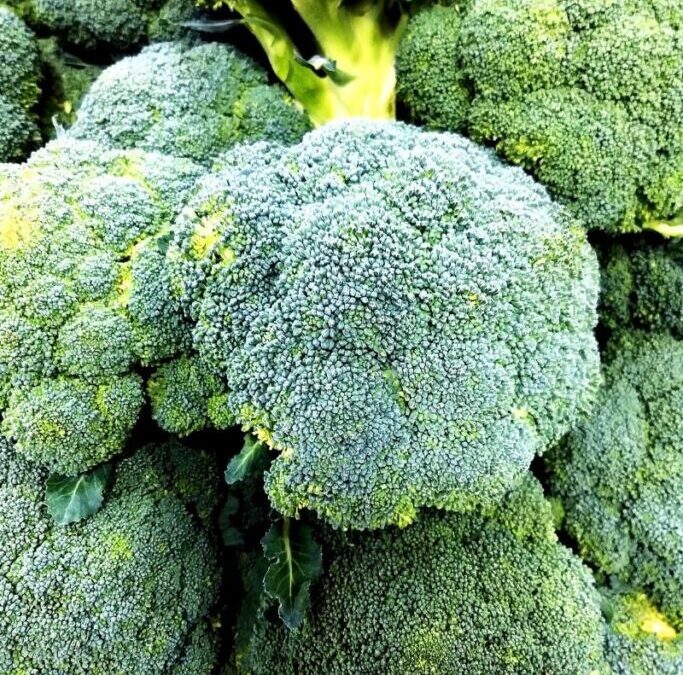What is Sulforaphane?
Sulforaphane is a type of natural phytochemical, called isothiocyanate, found in certain cruciferous vegetables, such as broccoli, cabbage, kale, and cauliflower. Sulforaphane is created by a reaction between glucoraphanin, a glucosinolate precursor to sulforaphane, and the enzyme myrosinase [1]. These enzymes found within plant cells combine to make sulforaphane when the plant is damaged (i.e. cut, chewed, or broken). Isothiocyanates are part of a plants defense system from various pathogens [2]. Let’s discuss the plentiful sulforaphane benefits and how you can incorporate this miracle compound into your daily life with either sulforaphane supplements and/or through your diet.
What Are Sulforaphane Benefits for Health?
This powerful nutrient has been linked to a range of health benefits. It has powerful antioxidant and anti-inflammatory properties, which can help protect against chronic diseases like cancer, heart disease, osteoporosis, GI disease, autism, and Alzheimer’s [3]. Sulforaphane also supports the body’s natural detoxification processes and can improve brain function and mental health [4]. Additionally, it may have anti-aging effects and help improve skin health. Incorporating sulforaphane-rich foods into your diet can be a great way to reap these benefits. I personally take a sulforaphane supplement in addition eating cruciferous vegetables.
Antioxidant and Cardioprotective Properties
Sulforaphane has strong antioxidant properties that combat oxidative stressors that can lead to DNA damage, heart disease and contribute to arrythmias [5]. Sulforaphane-rich broccoli extract (SFN-BE) taken for two weeks has been shown to lower the incidence of arrythmias during acute cardiac stress. Arrythmias are associated with life-threatening cardiac events.
It was surmised that the antioxidant effects of the sulforaphane increase expression of the body’s antioxidant defense system in the heart (specifically the upregulation of the Nrf2 pathway). This upregulation has cardioprotective effects. Additionally, SFN-BE has a positive effect on the autonomic nervous system, the part of the nervous system that regulates involuntary processes like blood pressure, breathing, and heart rate. However, the mechanism behind this is not yet well understood.
Detoxification and Neurodegeneration
Oxidative stress also plays a role in neurodegenerative disease, aging and the body’s ability to remove toxins. Excessive oxidative stress leads to DNA and cell damage which leads to inflammation and chronic disease. Glutathione is one of the body’s best regulators of oxidative stress. And guess what? Sulforaphane increases glutathione levels! Is there anything this phytochemical can’t do?
Furthermore, sulforaphane has been shown to induce phase II liver detoxification, part of the body’s detoxification process to remove harmful substances out of the body. It upregulates genes that are responsible for detoxification enzymes and glutathione synthesis, the master antioxidant [7]. These qualities also make sulforaphane hepatoprotective, meaning it protects the liver from injury.
Another incredible property of sulforaphane is its ability to possibly prevent Alzheimer’s Disease (AD). Studies have shown that sulforaphane reduces amyloid plaques, which are causative factors in AD [8]. Additionally, it lowers AD-related inflammation, free radicals and neurodegeneration. Because brain changes can occur 10-15 years prior to an official AD diagnosis, further research is needed on the timing of sulforaphane for its preventive and protective benefits.
Gut Health
Sulforaphane benefits the gut in many ways. In recent years, more studies have been conducted on gut health, the gut microbiome and its effects on Inflammatory Bowel Disease (IBD). IBD includes various conditions such as ulcerative colitis, Crohn’s disease, and celiac disease. SFN has strong anti-inflammatory effects by reducing pro-inflammatory cytokines, a part of the immune system that alerts the body of a pathogenic attack (viruses, bacteria, tumors, etc.). However, when cytokines are consistently upregulated, inflammation ensues.
Additionally, SFN can positively change the gut microbiome and heal the gut barrier [9]. Both of these are important determinants of how successful treatment is for IBD. The interplay of increased gut barrier function and gut microbiome changes reduced “IBD-like colitis” in mouse models [9]. Furthermore, these changes can also prevent irritable bowel syndrome (IBS).
Reducing Cancer Risk
We have talked about many sulforaphane benefits already, such as anti-inflammatory/antioxidant properties, ability to neutralize toxins, improving gut barrier and positive changes to the gut microbiome and combatting oxidative stress. All of these characteristics also play a role in cancer prevention. SFN has been shown to slow cancer cell growth. SFN may also block DNA mutations leading to cancer. Sulforaphane benefits are incredibly profound!
How Much Sulforaphane Anyway?
Various sources provide varying amounts and can be dependent on how it’s cooked. For instance, eating raw broccoli will provide about 10 times the amount of SFN that cooked broccoli does. And what if you don’t like cruciferous vegetables? Taking a SFN supplement is always an option! Taking a sulforaphane supplement with at least 400 mcg daily is the recommended amount for health benefits.
The Designs for health supplement, Brocco Protect, offers 500mg of a broccoli blend. Thorne offers Crucera SGS with 50mg of broccoli extract, while NuMedica offers BrocColinate Activated with 600 mg of broccoli extract and 60mg of sulforaphane glucosinolate. You can find these supplements through my dispensary by creating a Fullscript account.
Mom was right when she told you to eat your broccoli. 🥦 Sulforaphane benefits are remarkable!
Sources:
- Higdon, J. (2023, January 3). Isothiocyanates. Linus Pauling Institute. https://lpi.oregonstate.edu/mic/dietary-factors/phytochemicals/isothiocyanates
- Alvarez, M. V. (2015, January 23). Using natural antimicrobials to enhance the safety and quality of fresh and processed fruits and vegetables: Types of antimicrobials. Handbook of Natural Antimicrobials for Food Safety and Quality. https://www.sciencedirect.com/science/article/abs/pii/B978178242034700013X
- Cristofori, F. et. al, (2021, February 26). Anti-inflammatory and immunomodulatory effects of probiotics in gut inflammation: A door to the body. Frontiers in immunology. https://www.ncbi.nlm.nih.gov/pmc/articles/PMC7953067/
- Vanduchova et. al, (2019, February). Isothiocyanate from broccoli, sulforaphane, and its properties. Journal of medicinal food. https://pubmed.ncbi.nlm.nih.gov/30372361/
- Pereyra, K. V. et. al, (2020, November 10). Dietary supplementation of a sulforaphane-enriched broccoli extract protects the heart from acute cardiac stress. Journal of Functional Foods. https://www.sciencedirect.com/science/article/pii/S1756464620304916
- Sedlak, T. W., Nucifora, L. G., Koga, M., Shaffer, L. S., Higgs, C., Tanaka, T., Wang, A. M., Coughlin, J. M., Barker, P. B., Fahey, J. W., & Sawa, A. (2018, May). Sulforaphane augments glutathione and influences brain metabolites in human subjects: A clinical pilot study. Molecular neuropsychiatry. https://www.ncbi.nlm.nih.gov/pmc/articles/PMC5981770/
- Yoshida, K., Ushida, Y., Ishijima, T., Suganuma, H., Inakuma, T., Yajima, N., Abe, K., & Nakai, Y. (2015, September 21). Broccoli sprout extract induces detoxification-related gene expression and attenuates acute liver injury. World journal of gastroenterology. https://www.ncbi.nlm.nih.gov/pmc/articles/PMC4572790/
- Kim, J. (2021, March 13). Pre-clinical neuroprotective evidences and plausible mechanisms of sulforaphane in alzheimer’s disease. International journal of molecular sciences. https://www.ncbi.nlm.nih.gov/pmc/articles/PMC7999245/
- Bose, Dr. P. (2022, November 30). Broccoli and sprouts improve gut microbiota and reduce inflammation in IBD. News. https://www.news-medical.net/news/20221129/Broccoli-and-sprouts-improve-gut-microbiota-and-reduce-inflammation-in-IBD.aspx

